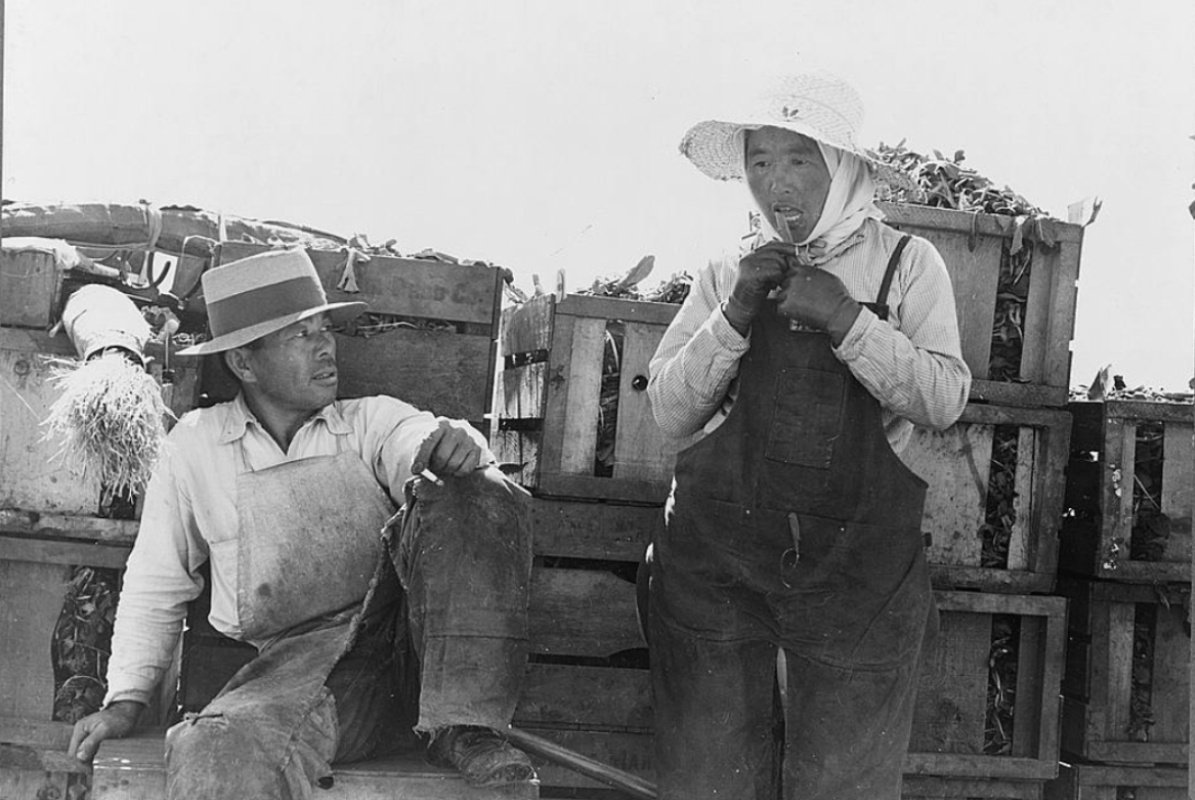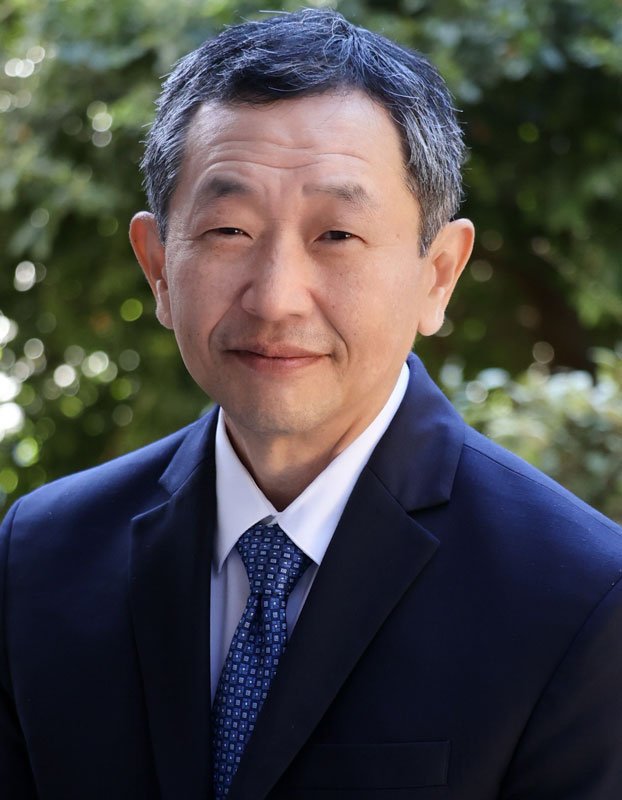A Q&A with civil rights lawyer and professor Robert Chang about the laws forbidding foreign ownership of agricultural land, and how they could lead to discrimination against Asians and Asian Americans.

A Q&A with civil rights lawyer and professor Robert Chang about the laws forbidding foreign ownership of agricultural land, and how they could lead to discrimination against Asians and Asian Americans.
February 25, 2025

Japanese agricultural workers packing broccoli near Guadalupe, California, in 1937. (Photo credit: Dorothea Lange, Library of Congress, Prints & Photographs Division, Farm Security Administration/Office of War Information Black-and-White Negatives)
Alien land laws date to the early 20th century, when thousands of Japanese immigrants came to California to build a better life. They used their agricultural knowledge do to so, eventually producing most of the state’s strawberries, snap beans, and celery in addition to nearly half its onions, tomatoes, and green peas.
Expand your understanding of food systems as a Civil Eats member. Enjoy unlimited access to our groundbreaking reporting, engage with experts, and connect with a community of changemakers.
Already a member?
Login
White farmers and landowners identified an economic threat. In 1913, California passed the Alien Land Law, prohibiting ownership of agricultural land by people ineligible for citizenship. Given that Asian immigrants weren’t permitted to naturalize then, it was effectively the country’s first anti-Asian land law, says Robert Chang, a professor at the University of California, Irvine School of Law, executive director of the Fred T. Korematsu Center for Law and Equality, and the Sylvia Mendez Presidential Chair for Civil Rights.
The law was infrequently used by prosecutors until World War II and the bombing of Pearl Harbor, when a raft of cases targeted people of Japanese ancestry. Still, coupled with a surge in anti-Japanese activism, the law drastically reduced Japanese-owned acreage, which peaked at nearly 75,000 acres in 1920 before declining. In 1948, the U.S. Supreme Court struck down portions of California’s law as it pertained to citizens, and it was repealed in 1956. The court didn’t rule on how the law applied to noncitizens.
In 1913, California passed the Alien Land Law, prohibiting ownership of agricultural land by people ineligible for citizenship.
Today, however, at least two dozen states—most recently Florida, Georgia, and Texas—restrict or forbid individuals, entities, and immigrants from “foreign countries of concern” from owning agricultural land, emphasizing national security. Brooke L. Rollins, the new U.S. Department of Agriculture (USDA) secretary, said in a recent interview that the Trump administration is interested in federal policies that would block “the Chinese purchase of our farmland.”
Many laws emerged as U.S.-China tensions flared after a suspected Chinese spy balloon was spotted over Montana in February 2023 and following claims that Chinese investors were buying farmland near U.S. military installations. The laws often mention a list of countries that include Russia, North Korea, and Iran, but their political backers have explicitly targeted Chinese nationals. Governor Ron DeSantis, for example, said Florida was taking a stand against the Chinese Communist Party.
Foreign ownership of U.S. farmland has expanded in recent years, passing 45 million acres in 2023 and accounting for about 3 percent of all farmland. That has led some farm groups to support restrictions on foreign ownership to protect domestic farmers. But, as Chang points out, that pressure is coming primarily from Canada.
A USDA report on foreign holdings of U.S. agricultural land states that Canadian investors represent 33 percent of foreign-owned land, followed by the Netherlands (11 percent), Italy (6 percent), and the United Kingdom (6 percent). Chinese entities own 277,000 acres of U.S. agricultural land, according to the USDA, accounting for less than 1 percent of all foreign-owned land. Mexico’s share of the total is also less than 1 percent, roughly on par with Japan.
Rather than being legitimate attempts to protect U.S. farmers, Chang argues that alien land laws are “entry points for further discrimination” against Asians and Asian Americans, in keeping with their history. Chang is co-counsel in a federal lawsuit challenging a law in Arkansas, where his client, a naturalized U.S. citizen, was flagged by the state’s secretary of agriculture because his company, which operates a digital data center on agricultural land, “may have significant ties to China.”
As alien land laws spread, and with the legal future still to be determined, Civil Eats spoke with Chang about the nativist origins of alien land laws, why they are ineffective in protecting U.S. farmers, and what’s at stake for immigrants, farmers, and the food system, as they proliferate.
What is the history of the recent spate of alien land laws?
There’s a long history regarding the power of either a nation or a state to restrict land ownership to citizens, with the idea that land ownership was tied to the security of a kingdom. When the United States inherited this tradition, some of the early Western territories began with a strict law that covered all aliens.
But when tensions arose as immigration from China increased—and then immigration from Japan after Chinese exclusion was put into place in 1882—a number of politicians and landowners thought the security of the state was possibly being endangered if farmland could be held by Asian immigrants. And so, in 1913, California passed what is regarded as the first [specifically] anti-Asian alien land law.
Why are these laws resurfacing now?

Robert Chang is a professor at the University of California, Irvine School of Law, executive director of the Fred T. Korematsu Center for Law and Equality, and the Sylvia Mendez Presidential Chair for Civil Rights.
My quick answer is dog-whistle politics. We can go back and recast the reasons put forward when the U.S. Supreme Court said, in 1923, that these anti-Asian alien land laws were OK in the case Terrace v. Thompson, which challenged Washington State’s alien land law.
The court said the state had a legitimate concern that all of the farmland in Washington might come into the hands and control of aliens who had not declared in good faith their intention to become citizens. That becomes really critical in understanding how it’s articulated today. [Washington’s anti-Asian laws were eventually repealed in 1966.]
In terms of the Arkansas law specifically targeting ownership of agricultural land, there’s this idea that if some foreign entity gets control of the food supply, they might manipulate it in a way that harms people in Arkansas and all the markets that Arkansas farmland serves. There’s this stated notion of threat.
And you’re saying this is all a dog whistle—an effort to appeal to voters and stoke racial division?
That’s my opinion. If the concern really is about national and state security, how real is that concern versus being able to say that as a politician I’m taking a strong stance to protect you?
Why is agricultural land often a specific target?
“If we restrict pathways to belonging—to becoming full members of our society—based on connection to a so-called country of concern, I think that undercuts the great mission of our country of allowing people from different groups to become full members.”
The choice of agricultural land is strategic. You can imagine that if somebody really had the means and the will to disrupt our nation’s food supply, the impact of that is tremendous. It gets at our very survival. Agriculture lends itself very easily to this concern. If we accept that it’s plausible that an entity could purposely insert itself within our agricultural system and at some point manipulate it for their own advantage, the question is whether a blanket law like we’re seeing now is the best approach.
Who and what is at risk if these laws hold up in court?
The people who are at risk are non-U.S. citizens of Asian ancestry. But then, because of the imprecision and lack of knowledge that parties in commercial transactions might have, that can also include U.S. citizens of Asian ancestry.
The other concern I have is that the alien land laws were only the start of a lot of state and local discrimination against people of Asian ancestry in the early 1900s. States realized that the arguments they put forward were accepted. So, they began with the alien land laws, but then they also restricted access to certain occupations, including becoming a member of the bar [to practice law]. Once discrimination in one sphere is legitimated, history teaches us that it goes to other areas.
Land access is a major obstacle for beginning farmers and farmers of color, including Black and Latino farmers. How concerned are you about what the movement to pass these laws could mean for land access and rights in the coming years?
If we restrict pathways to belonging—to becoming full members of our society—based on your connection to a so-called country of concern, I think that undercuts the great mission of our country of allowing people from different groups to become full members. It also can impede economic pathways for the affected individuals.
There’s also a real problem when the danger is cast as China, or people who might be controlled by China. That gets extended then to Chinese Americans or people who might be thought to be Chinese American. You can see how, when you have a law like this, it can lead to broader discrimination.
Some groups that represent farmers and work for a fairer agricultural system in the U.S. are in favor of laws that restrict foreign investment and ownership of farmland. They say the laws can prevent land from being bought up by foreign investors, thereby keeping land more affordable and available for new and beginning farmers. Could these laws actually support land access for a wider range of farmers?
“The other concern I have is that the alien land laws were only the start of a lot of state and local discrimination against people of Asian ancestry in the early 1900s.”
If the problem is that agricultural land is being bought up by foreign investors and global corporations, which makes it harder for new and beginning farmers to purchase land, then it would seem that a more general law targeting foreign investment and ownership would be more effective than the kind of laws that have passed in numerous states, where often the target appears to be companies and individuals who may be associated with the People’s Republic of China.
The largest foreign investors come from Canada, the United Kingdom, and Europe. To the extent that foreign ownership is the problem, the new laws don’t address the countries that own the most agricultural land in the U.S.
Generally, lawmakers don’t present these laws as intending to prevent Asian Americans from owning land, but with the aim of stopping foreign governments and corporations from controlling farmland. Are these laws preventing citizens and their families from owning land and farming here?
Part of the problem with some of these laws is the way they define the banned category of owners. For example, the Florida law forbids ownership of certain lands by “foreign principals” from a “foreign country of concern.”
The majority of Asian American citizens in the U.S. are foreign-born. If a seller receives multiple offers for the purchase of land, and one of them appears to be of Asian ancestry and may not speak English fluently, that seller may choose not to sell to that person because of fear of becoming entangled in Florida’s alien land law. In instances where a seller doesn’t meet the person, the seller may make decisions based on Asian surnames.
Are farmers, landowners, and the other people who contribute to our food system unwittingly being used by the proponents of alien land laws to foster discrimination?
They might be. If those in the agricultural industry don’t believe that these are legitimate concerns, it would be great if people started saying so. That might help counter the use of this idea of a threat to agriculture and the food system.
This interview has been edited for length and clarity.

July 30, 2025
From Oklahoma to D.C., a food activist works to ensure that communities can protect their food systems and their future.
Like the story?
Join the conversation.